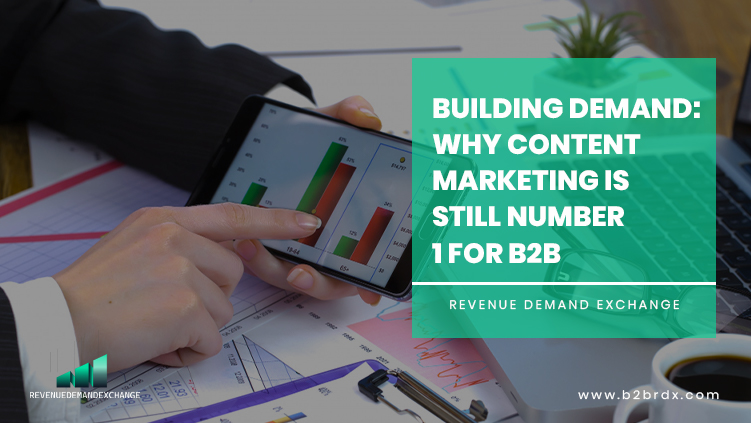Why Content Marketing Is Still Number 1 for B2B

New tools and strategies are always coming out in the fast-changing world of B2B marketing, such as AI-driven lead scoring and automation systems. Even though these new ideas are becoming more popular, content marketing is still the best and most effective way to create demand. Content marketing is different from traditional advertising or one-off campaigns since it generates value over time by developing trust, educating consumers, and keeping brands in the buyer’s mind throughout the buying process.
Content is what connects a brand with its audience in meaningful ways for modern B2B enterprises, where decisions take longer and involve more than one person. The truth is that cold pitches alone don’t convince executives and decision-makers. They want information, statistics, and advice that show a company understands their problems. This is where content really shines, translating thought leadership into real demand. Here are six important reasons why content marketing is still the best way to get B2B leads today.
1. Content Builds Authority and Thought Leadership
Trust is the most important factor in B2B marketplaces. Customers want to work with companies that not only give solutions but also know a lot about their field. Blogs that are well-researched, industry whitepapers, and studies that are insightful demonstrate to prospects that a company knows what their problems are and how to help them solve them.
Brands may show that they are thought leaders by giving industry predictions, case studies, and tactics that people can use. This authority gives them credibility, which makes it much easier for buyers to choose them over competitors who may simply use sales pitches. Over time, consistent content turns a business into a trusted source, which naturally leads to more demand as people look for help from them.
2. Content Improves SEO and Organic Visibility
Most B2B customers start their trip with a Google search, no matter how polished your outbound marketing plan is. They look for vendors, type in questions, and compare solutions. Companies who put money into material that is optimized for search engines are much more likely to meet this need at the research stage.
Publishing optimized blogs, guides, case studies, and FAQs is a good way to get long-term organic presence. Paid ads only show up when you have money, whereas SEO-backed content keeps bringing in traffic. This organic reach is quite important for B2B companies who want to contact small groups of people who are really interested in buying. When people look for solutions, content marketing makes sure that your firm is one of the first results.
3. Content Helps Buyers Along Their Complicated Journeys
Most of the time, B2B purchases are not made on a whim. They frequently involve more than one person, take longer to evaluate, and cost more money. One ad or sales call isn’t enough to get someone to go through this process. Content helps with this problem by showing potential customers what to do step by step.
At the awareness stage, infographics and articles about problems help people learn about them. During the consideration stage, buyers look at comparison guides, webinars, and case studies to help them decide between several solutions. Finally, at the decision stage, extensive product demos, ROI calculators, and testimonials give people the confidence they need to close agreements. Businesses build relationships and keep people interested, even when the decision-making process takes a long time, by linking content to each stage of the funnel.
4. Content Improves the Quality of Leads and Engagement
When it comes to B2B demand generation, it’s not just about how many leads you get, but also how good they are. Content marketing naturally targets the people who are most likely to be interested in what a company has to offer by speaking directly to the problems they answer. For instance, someone who downloads a long whitepaper may be more interested than someone who only visits the site.
Metrics like how long someone spends on a page, gated downloads, and webinar attendance can help tell you where a lead is in their journey. After that, marketers can tailor follow-ups to include nurturing campaigns that are relevant. This method increases conversion rates since content draws in and identifies decision-makers who are really interested.
5. Content Powers Many Marketing Channels
A single piece of content can power a whole multichannel demand generating plan. For instance, you may turn a research-based blog into infographics for LinkedIn, short films for Instagram, or highlights from an email newsletter for nurturing efforts. One piece of content is a strong base for making sure that message stays the same across all devices.
In the B2B world, where you need to be present on a lot of different digital platforms to reach your target, content scales demand creation well. Content lets businesses build a central subject and share insights across all channels, such as social media, webinars, and account-based marketing outreach, instead of breaking up their marketing efforts. This capacity to work across channels makes it a long-term investment with a lot of reach.
6. Content Gives Better ROI Than Paid Ads
Paid commercials and cold outreach are examples of short-term strategies that get results quickly but don’t last. The traffic stops when the campaign is over. On the other side, content gives you more and more value. A single blog or eBook established today can keep bringing in leads and getting people to see it for years to come, without any extra expenditure.
B2B companies with robust content ecosystems usually have a far lower cost per lead than those that only use ads. Also, when combined with analytics, content marketing lets companies evaluate conversions, pipeline influence, and customer lifetime revenue to get a clear picture of ROI. Companies that want to expand should invest in content since it will last for a long time.
Conclusion
Content marketing is still the best way to get B2B leads since it doesn’t simply sell; it also teaches, persuades, and creates trust over time. Content continues to be the best technique because it boosts authority, improves SEO exposure, guides prospects through complicated buyer journeys, increases engagement, fuels numerous channels, and delivers the best ROI.
In a time when buyers are less likely to trust aggressive sales tactics, firms that always offer value through content stand out. Content marketing is not only a strategy for B2B executives who want to expand their businesses; it’s the foundation that turns ideas into impact and demand into sales.





